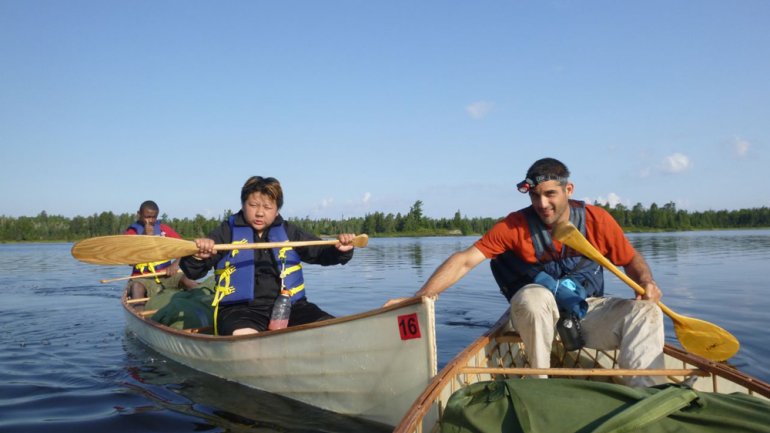Five Questions Salon Edition with Phil Winger of Urban Boatbuilders
Urban Boatbuilders is educational nonprofit dedicated to building community, skills, and confidence in at-risk youth through the ancient art of boatbuilding. I had the opportunity to ask master boatbuilding instructor Phil Winger a few questions in preparation for the last Library Salon Series event of the spring - “Building Community with Urban Boatbuilders” - on Wednesday, June 10.
Can you tell us a little bit about your background? What brought you to Urban Boatbuilders?
Since 2000, I have worked at Urban Boatbuilders as an instructor and then a program manager. I came because I love to build and to empower, and because I knew the potential (specifically of wooden boatbuilding) to impact young people. I myself had been transformed by my early experiences building things from wood - particularly model airplanes, sculpture, furniture, and then finally boats. I believed that I could bring this transformative experience to people who do not have as many opportunities as I did growing up. I felt a responsibility to do it, and I was determined to make it happen.
Urban Boatbuilders wasn't immediately able to hire me after I completed my training at the Northwest School of Wooden Boatbuilding in 2000, so I briefly resumed my former position as a youth counselor at St. Joseph's Home for Children in Minneapolis. Fortunately, I didn’t have to wait long, and in the summer of 2000 I was hired on a contract basis at Urban Boatbuilders. I cleaned and organized the shop and helped with projects here and there. As they got to know me, they asked me to help build boats with various schools in St. Paul. In the spring of 2001, I was hired on a more permanent basis.
What is your favorite aspect of boatbuilding?
That is tough to answer, and I don't think I could honestly identify a singular part. A few of my reasons are: the power of the building process to captivate, inspire, and challenge so many people; the sensation of shearing wooden fibers with a sharp tool; the constant mix of varied operations and skills; that moment when the setting sun glows on a lapstrake boat under construction; the smell of a cedar shaving; and trusting your craftsmanship against a small-craft advisory on a big lake.
Though you didn’t start with the boatbuilders until 2000, can you give us any insight as to the impetus for starting this organization in 1995?
My understanding is that in the early '90s - amid a national resurgence of interest in the craft of building wooden boats - a critical mass of enthusiasts with backyard projects formed an association that involved visits to each others' projects, Q&A, and beer. A certain faction of these builders shared the vision that wooden boatbuilding was an ideal mechanism to attract, engage, and inspire young people in the Twin Cities. Particularly those individuals who may have more than the average number of challenges in life. These people had a unique set of skills and the willpower to turn that vision into a nonprofit organization that is now in its 20th year. They included community organizers, engineers, entrepreneurs, and even a professional boatbuilder.
Can you share a particularly meaningful experience that you have had working with individuals and apprentices at Urban Boatbuilders?
I work twice a week at Boys Totem Town (Ramsey County Juvenile Corrections) delivering a program where we use wooden boatbuilding as a hands-on learning experience during the school day. I have built with many skilled and promising young men there over the years, but one stands out in my mind. We got to know each other there while building a canoe in 2007, and then we hired him as an apprentice in our shop when he was released. I saw him thrive in his new school. He'd come in to work and quiz me on macroeconomic theory. His attitudinal shift towards school and life was dramatic and a pleasure to see. That summer, we took a group of apprentices on an 80-mile trip down the Mississippi in boats they'd built, and this young man impressed me with his perseverance and his willingness to venture so far from his comfort zone. He and I spent a year building boats together and paddling on the water. This formed a foundation that he was able to draw support from during the bumps in his early adult life. He had a few significant ones. I heard about his struggles to find and keep work, but he persevered and kept his head up. In retrospect, I consider it a privilege that he considered me a part of his network of support. Today, he is married with two happy kids and a spunky wife. He has had steady employment for years now. His current employers were among the few who decided to give him the benefit of the doubt. Given his early trajectory, it is a rewarding thing to be part of the network that helped him change directions.
What does the future entail for this wonderful organization?
Since moving to our new and larger shop, our operations have grown. We now work with many more youth. Our leadership has an ambitious vision, and honestly the pace has taken some getting used to. I still feel privileged to be part of that vision. My role is shifting a bit towards training new boatbuilding instructors and writing manuals/procedures, but I still get to go to Totem Town twice a week to help young men develop new skills and confidence. One of our most important organizational goals in the short run is to keep our focus on a quality experience for the youth that go through our programs.
Presented by the American Craft Council, the Library Salon Series is a series of free public presentations exploring craft, making, and art.
This activity is made possible by the voters of Minnesota through a Minnesota State Arts Board Operating Support grant, thanks to a legislative appropriation from the arts and cultural heritage fund.




